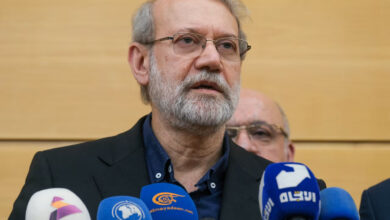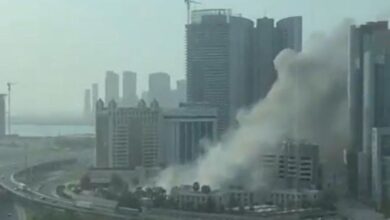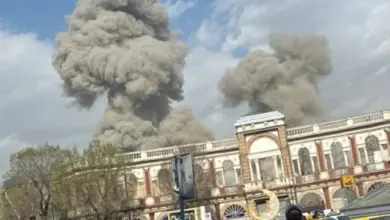An Egyptian soldier was killed and four Palestinians were wounded in a gun battle on Wednesday during a protest against an underground wall Cairo is building on the Gaza border.
The violence was the most serious between Egyptian and Hamas forces since Cairo began constructing the underground steel barrier a month ago. The project could choke off the movement of weapons and goods through tunnels into the Gaza Strip, and negatively affect the limited supply of basic commodities Gazans have become totally dependent on it since the start of the 2006 siege.
Israel and Egypt maintain a blockade of the territory, which is ruled by Hamas Islamists. Cairo has come under US and Israeli pressure to stop the trafficking.
On the Egyptian side of the frontier, security officials said a 21-year-old soldier was killed by gunfire from the Palestinian part of the divided town of Rafah.
Witnesses on the Gaza side of the border said members of Hamas’s police force fired at the Egyptians.
Hundreds of Palestinians had turned out to protest against the wall. Witnesses said dozens of demonstrators threw rocks at Egyptian soldiers, who then opened fire, wounding four Palestinians.
An Israeli military officer, who is briefed on Gaza intelligence, told Reuters last week the Egyptian wall could significantly stem Palestinian arms smuggling into the territory once it is completed in several months.
Cairo has played down the scope of the dig on the 14km border. Hamas says the "wall of death" could choke off tunnels providing a commercial lifeline for Palestinians in the Gaza Strip.
Egyptian officials have said steel tubes were being placed at several points along the frontier to form a barrier, but have not elaborated on its purpose.
Tunnel-builders say some 3,000 underground passages were operational before Israel launched a three-week Gaza offensive a year ago, but only 150 were still functional following the conflict and subsequent Israeli air raids.
Meanwhile, Egyptian authorities have agreed on Wednesday to allow Viva Palestina humanitarian convoy, led by British MP George Galloway into the Rafah border crossing a day after the violent clashes between the pro-Palestinian activists and Egyptian police at El-Arish Port.
“We concluded a deal with Egyptian authorities to transfer 155 cars of our shipment through the Rafah crossing,” Zuheir Birawi, the convoy’s spokesperson told Al Masry Al Youm in a telephone interview.
The remaining 43 cars, according to Birawi, will be reshipped to Palestinian refugees in Syria and Lebanon because the convoy’s organizers rejected an offer to transfer the cars through the Israeli-controlled Karam Abu-Salem border crossing.
“We stand firm to our principle against any kind of cooperation with Israeli authorities,” explained Birawi.
Another convoy’s member, Turkish MP Mehmet Nil Hidri, however, was quoted by the official Middle East News Agency as saying that the remaining cars will be stationed at El-Arish port for two months before being allowed to Gaza by Egyptian authorities.
Last night, Egyptian security forces clashed with the convoy’s members who were protesting Egypt’s decision to transport some of the aid through an Israeli controlled checkpoint.
The protesters instead want aid transported across the Egypt-controlled Rafah border.
Forty activists were injured, while medical sources say 15 policemen were also hurt.
The British MP who led the activists, George Galloway, says the police are responsible for the injuries.
"They moved – all these riot police – to the gates of the port in a very threatening way, with shields and sticks and water cannons," he said.
"It was inevitable that they were going to attack and they attacked a group of people who came here, thousands of miles, to deliver aid to Gaza."
Israel imposed the blockade in 2006 after one of its soldiers was seized by militants who tunneled under the Israel-Gaza border. It was tightened after Hamas wrested control of the Gaza Strip from forces loyal to Palestinian President Mahmoud Abbas’s Fatah movement.
The blockade has drawn international condemnation over hardships caused to Palestinians in the impoverished coastal enclave and its impact on efforts to rebuild homes and infrastructure after the Gaza war.




